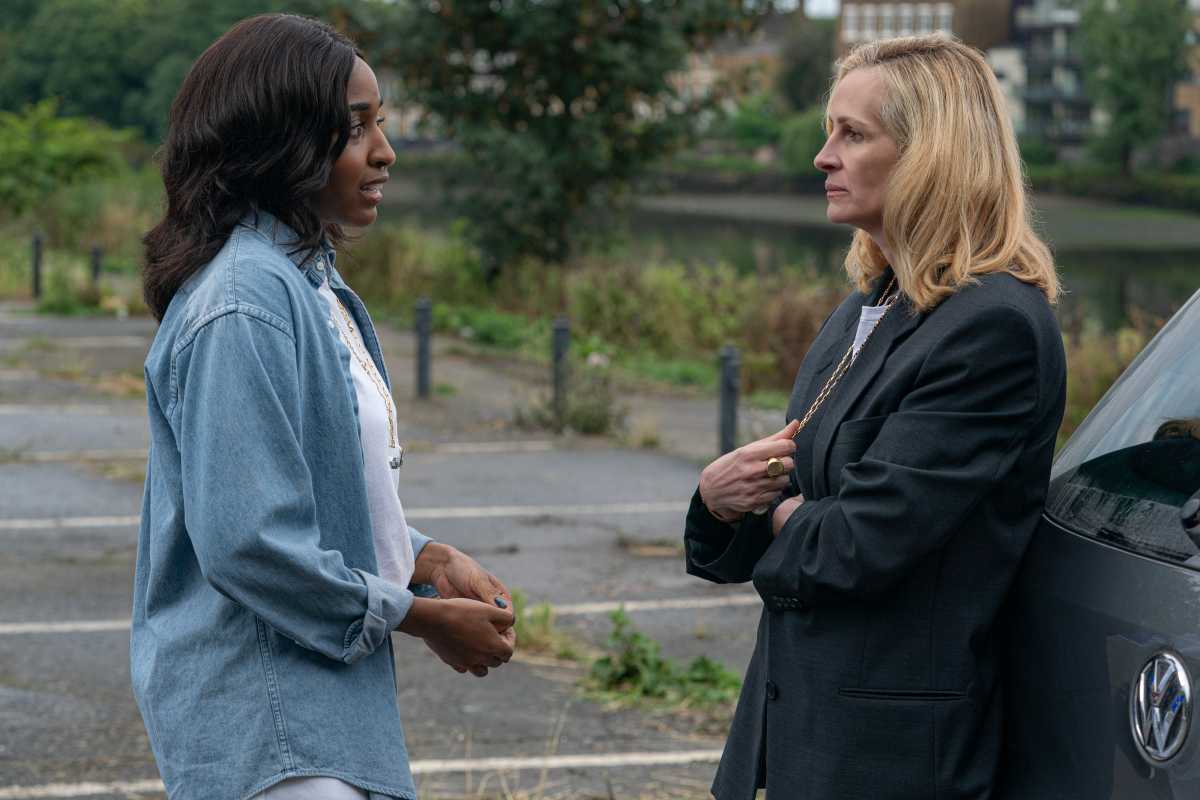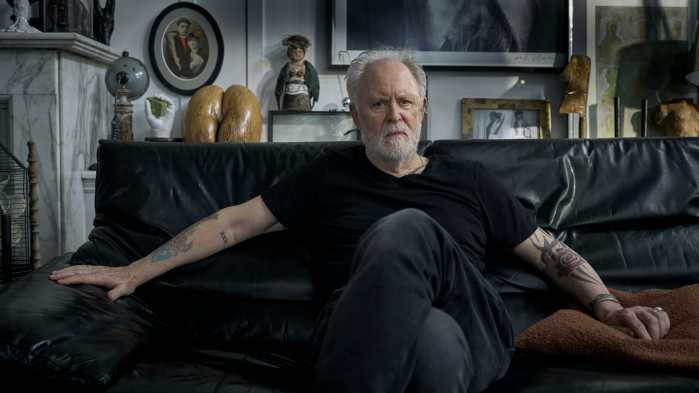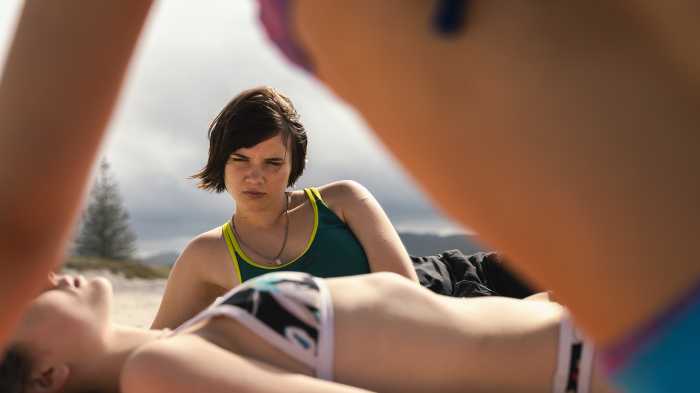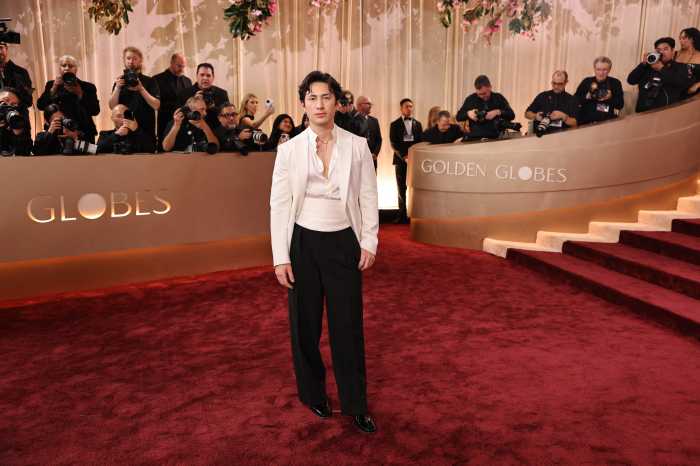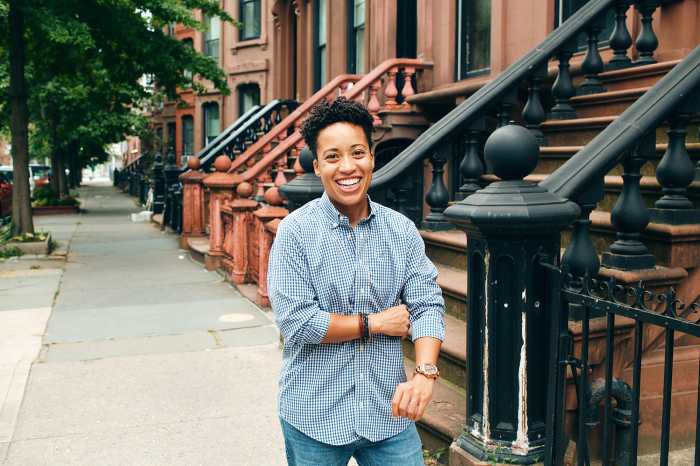Gay director Luca Guadagnino’s “After the Hunt” sets up a character study of a messy, destructive woman and an op-ed about cancel culture and performative leftist politics, battling with each other for supremacy. Nora Garrett’s script lets both down. Even as its dialogue attacks people for seeing each other as symbols of their race, gender and sexuality, the film presents them as such. Take Hank (Andrew Garfield), whose scruffy beard, constant cigarette smoking, and visible chest embody his retrograde masculinity. It reveals that Maggie’s (out actor Ayo Edebiri) father is a billionaire as a “gotcha” against anything she may have suffered for being a Black, queer woman. The credits own the libs — or at least signal Guadagnino’s influences — by using the same font as Woody Allen’s. The script mistakes arbitrary plot twists for complex thought.
Alma (Julia Roberts) wakes up vomiting each morning before going to work as a Yale philosophy professor. She lives with Frederik (Michael Stuhlbarg), a psychoanalyst. On the verge of being considered for tenure, she’s extremely nervous about her prospects. At a party she throws for her colleagues, Alma and Hank, who’s competing for the same job, spar with each other about whether her gender will win it for her. After the party ends, Alma spies on Hank and Maggie leaving and taking the elevator. Through her door’s peephole, her vision cuts off when they go down a flight. A few days later, Maggie returns to Alma’s house, alleging that Hank sexually assaulted her after they went back to his apartment for a drink. Not knowing whom to believe, Alma accepts dinner with Hank so they can discuss the situation.
Julia Roberts puts all she can into playing Alma, but Garrett’s script relishes tossing her about at its mercy. By the second half, Alma is quite beleaguered, and Roberts is made up with pale skin and heavy eyebags. The spirit of an overwhelmed soul comes through her performance. As the story grows darker, it takes the oh-so-innovative tack of turning the lights down and making gray the dominant color. Guadagnino and cinematographer Malik Hassan Sayid are skilled enough to create a mood of overbearing gloom, but “After the Hunt” doesn’t do much beyond that.
I don’t expect “After the Hunt” to be a docudrama about contemporary college life, but it strikes a dated note. An epilogue reveals that it was set in 2020, but the script dips so heavily into 2018-era fearmongering about “cancel culture” on campus that it already feels like a period piece. The climate it depicts has moved radically to the right, but it’s still stuck in a tired grouchiness. When a therapist praises a dive bar’s bravery for playing Morrissey, the film doesn’t explicitly applaud her, but it might as well. Garrett could have done all her research by reading New York Times op-eds. It doesn’t even have a sense of humor about this: an academic discussion by two men on “The Future Of Jihad Is Female” is a good joke, but it’s not intended as one.
The philosophy lectures set up the film’s themes. As Alma speaks about Michel Foucault’s idea that we now regulate our behavior informally for the approval of others, the camera calls our attention to the smartphone on her desk. Guadagnino utilizes shallow focus to illustrate each character’s self-absorption. Alma, Hank and Maggie all receive close-ups in which they deliver a monologue, while the person listening is a fuzzy blur. Sometimes the focus shifts.
The film’s use of music is similarly overbearing. Frank has the passive-aggressive habit of blasting it while his wife is trying to talk, walking in and out of the kitchen so that it becomes even louder. The opening shots are set to the hard, steady beat of a ticking clock. A scene in a hospital uses electronic equipment to create that same effect. Even Trent Reznor and Atticus Ross’ score pounds away at dissonant piano chords as if they were providing backing for the characters’ words.
To be as kind as possible to “After the Hunt,” its characters behave confusingly because they don’t understand or won’t admit their own motivations. Its grip upon any of them, even Alma, quickly slips away. Are they conscious cynics trying to get in academia, or just people damaged by life’s struggles? It treats Maggie even worse than Alma, presenting her as a prop for a white woman’s struggle. Maggie even lusts after her mentor and dates a non-binary person for clout. The script just throws trauma in Alma’s direction, while also informing us that she’s a terrible person. (One of the final turns is particularly reactionary.) “After the Hunt” gives up the ghost, especially compared to Todd Field’s very similar 2022 “TAR,” too proud of its own ambiguity and supposed potential to win Oscars.
“After the Hunt” | Directed by Luca Guadagnino | Amazon/MGM | Opens Oct. 10th at the AMC Lincoln Square

